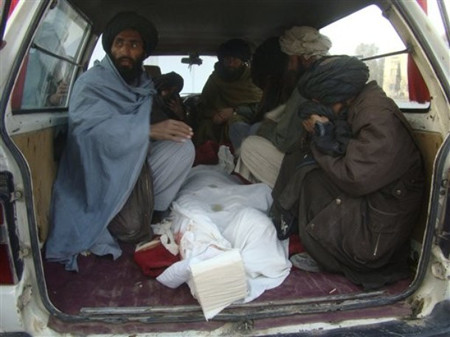A roadside bomb has killed 13 civilians in eastern Afghanistan, government officials said.
The interior ministry said in a statement that the vehicle, a motorised rickshaw, was hit in the morning.

Body of a roadside bomb blast victim lies in a vehicle as Afghan men mourn next to it at a hospital in Lashkar Gah, Helmand province southern Afghanistan, Thursday, Dec. 30, 2010. A roadside bomb blew up next to a minibus at a crowded intersection on a major highway in southern Afghanistan on Thursday, killing civilians, officials said. (Photo: AP)
The dead include women and children. The attack took place in Khoshamand district in Paktika province.
It is not known who carried out the attack, but the area on Pakistan's border is a stronghold of the Taliban and al-Qaeda militants.
The interior ministry blamed the attack on "enemies of Afghanistan's people" - a phrase often used to describe the Taliban.
A police investigation has been launched, it said.
Paktika Governor Mohibullah Samim told the BBC that the attack took place as families were taking children to a local health clinic.
"Most of those killed were women and children," he said. "All the dead were civilians."
Mr Samim said that the Taliban were responsible because they had "carried out similar attacks in the past".
The BBC's Bilal Sarwary in Kabul says that the clinic may have been targeted because a nearby road - close to the governor's office - is often used by Afghan and international troops.
Our correspondent says that Wednesday's attack was the third roadside bombing in Afghanistan over the last week.
On Sunday at least nine people attending a wedding were killed by a roadside bomb in the northern province of Baghlan, officials said.
The day before that blast, six civilians were killed in a roadside blast in the southern province of Helmand.
The BBC's Quentin Sommerville in Kabul says roads are increasingly in the front line of the war in Afghanistan.
Civilian and military casualties are at levels not seen for a decade - last year more than 2,400 civilians died, with roadside bombs the biggest source of casualties, our correspondent says.



